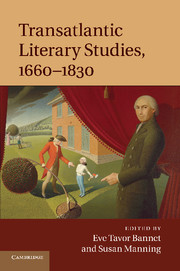Book contents
- Frontmatter
- Contents
- Notes on contributors
- Acknowledgements
- Introduction: British and American genres
- Chapter 1 Transatlantic books and literary culture
- Chapter 2 Transatlantic utopianism and the writing of America
- Chapter 3 Tales of wonder, spiritual autobiographies, and providence tales
- Chapter 4 Life writings
- Chapter 5 Benjamin Franklin and transatlantic literary journalism
- Chapter 6 Theatre, drama, performance
- Chapter 7 Transatlantic American Indians
- Chapter 8 Literature of the ocean
- Chapter 9 “To gird this watery globe”
- Chapter 10 Ghostly and vernacular presences in the black Atlantic
- Chapter 11 Susanna Rowson and the transatlantic captivity narrative
- Chapter 12 Domestic fiction and the reprint trade
- Chapter 13 Transatlantic Gothic
- Chapter 14 Transatlantic Romanticisms
- Chapter 15 Journeys of the imagination in Wheatley and Coleridge
- Chapter 16 Transatlantic historical fiction
- Further reading
- Index
- References
Chapter 5 - Benjamin Franklin and transatlantic literary journalism
Published online by Cambridge University Press: 05 January 2012
- Frontmatter
- Contents
- Notes on contributors
- Acknowledgements
- Introduction: British and American genres
- Chapter 1 Transatlantic books and literary culture
- Chapter 2 Transatlantic utopianism and the writing of America
- Chapter 3 Tales of wonder, spiritual autobiographies, and providence tales
- Chapter 4 Life writings
- Chapter 5 Benjamin Franklin and transatlantic literary journalism
- Chapter 6 Theatre, drama, performance
- Chapter 7 Transatlantic American Indians
- Chapter 8 Literature of the ocean
- Chapter 9 “To gird this watery globe”
- Chapter 10 Ghostly and vernacular presences in the black Atlantic
- Chapter 11 Susanna Rowson and the transatlantic captivity narrative
- Chapter 12 Domestic fiction and the reprint trade
- Chapter 13 Transatlantic Gothic
- Chapter 14 Transatlantic Romanticisms
- Chapter 15 Journeys of the imagination in Wheatley and Coleridge
- Chapter 16 Transatlantic historical fiction
- Further reading
- Index
- References
Summary
Literary journalism in the early modern era was typically found in newspapers and magazines, the daily or weekly serialized print media that served up what passed for news alongside more or less self-consciously “literary” materials, such as poetry and prose essays, generally on matters related to the social formation (particularly, character and manners) and government (often the critique of policy). Literary journalism appeared in learned journals, but was more common in serial publications that were intended for amusement and/or edification. Literary journalism here can be taken to mean periodical or serialized fictional writings of a self-consciously “literary” style, fictional rather than mere factual reporting. Its common fare included “letters” to the editor or between persons known to the editor, as if in a club; single or serialized pieces that elucidated aspects of the “character” of the “writer”; little pieces of ribaldry or burlesque news and mock advertisements; literary allegories on social and/or political matters; essays linking contemporary to classical life; and items of this kind. In London during the late seventeenth and early eighteenth centuries, literary journals revealed the gossip and interests of tavern and coffeehouse culture, and after the Spectator, consolidated the cultural values of the era's middling-level people.
This chapter will focus on the transatlantic literary journalism available in newspapers and magazines rather than that found in pamphlets, such as Daniel Defoe's Journal of the Plague Year (1722) or Benjamin Franklin's Narrative of the Late Massacres (1764), which today might fall into the category of “literary journalism.” After briefly considering the formative contexts of literary journalism, the chapter will discuss perhaps the best-known transatlantic practitioner of literary journalism in the eighteenth century, Benjamin Franklin, whose writings appeared in North America, Britain, and Europe in his lifetime and in many countries around the globe (and on the internet) since. The chapter will conclude with suggestions for future work in the field.
- Type
- Chapter
- Information
- Transatlantic Literary Studies, 1660–1830 , pp. 75 - 90Publisher: Cambridge University PressPrint publication year: 2011



